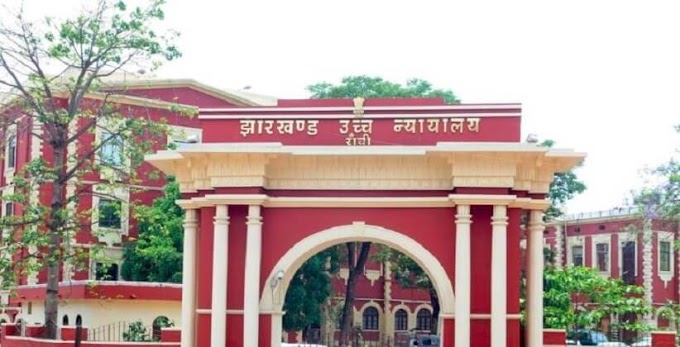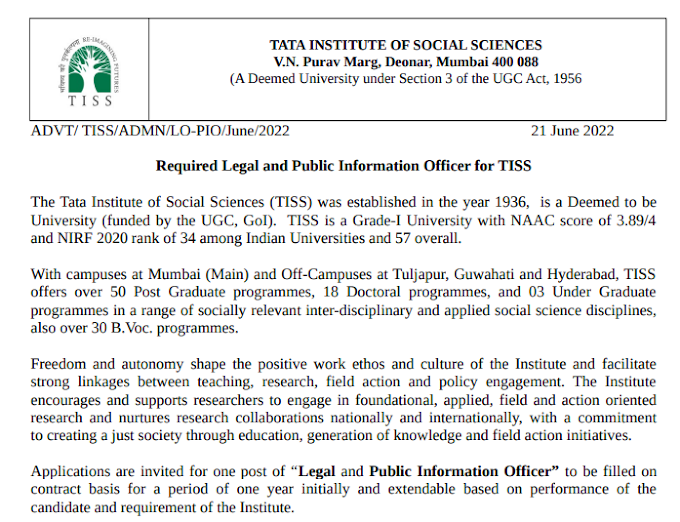LAW MANTRA (THINK
BEYOND OTHERS)
Registration No:- 150 in Book No.4 Vol
No.3, 603 of 2018 NCT of Delhi
I.S.S.N 2321- 6417(Online) I.S.S.N
2394-7829 (Print)
Ph.: +91- 9310053923 Website: www.lawmantra.co.in
CALL
FOR CHAPTERS: EDITED BOOK BY LAW MANTRA: SUBMIT BY MAY 25
About Law Mantra Trust
“Law Mantra” (headquarters New Delhi)
(Registration No 150 in Book No.4 Vol No 3, 603 of 2018) is not for profit
organisation running for the purpose of enhancing legal academics and legal
awareness in the society and in the practice of the same. “Law Mantra” is a
body of Jurists, Advocates, Academicians and Students running for the purpose
of enhancing legal academics and legal awareness in the society and in the
practice of the same. We at Law Mantra enable people to take responsibility for
the situation of the deprived Indian women and children and so motivate them to
seek resolution through individual and collective action thereby enabling women
and children to realize their full potential.
CALL FOR CHAPTERS IN EDITED BOOK
TITLED
ABROGATION OF ARTICLE 370 & ARTICLE 35: CONSTITUTIONAL ANALYSIS
Law Mantra which is running for the
purpose of enhancing legal academics, legal awareness and which always believes
on motto “Think Beyond Others” invites call for Chapters in Edited Book.
Since, whole country is in the state of
Total Lockdown because of Novel COVID-19 we would like to involve legal
academia to write quality of research paper on above mentioned titled.
ABROGATION OF ARTICLE 370 &
ARTICLE 35: CONSTITUTIONAL ANALYSIS
The Centre has repealed Article 370 and
Article 35-A of the Constitution that grants special status to the state of
Jammu and Kashmir.
Sub Title:
·
Abrogation of Articles 370 and
35A: Assault on the Constitution
·
Art-370, 35 A of The
Constitution of India: A Constitutional History of Jammu and Kashmir
·
Relevancy of Art- 370, Art-35 A
of The Constitution of India in the present scenario.
·
Pros and Cons of Art-370 of The
Constitution of India for the People of Jammu and Kashmir
·
Comparative discussion on
Art-370 and Art-371 of The Constitution of India
·
Analysis of special provision
of various States with Jammu and Kashmir
·
Special Relationship of Jammu
and Kashmir with the Union of India.
·
Constitutional Status of
Art-35A of the Constitution of J&K and 370 of The Constitution of India
·
Abrogation of Article 370,
Art-35A
·
Abrogation of Article 370: can
the president act without the recommendation of the constituent assembly?
·
Accession of new State in Union
of India
·
Indian Federalism : Cooperative
or Coercive with reference to JK
·
Right to self-determination
under Indian Constitution and international law
·
Right and duty of Individual and Indian
Constitution with reference to JK
·
What rights will Kashmiris lose
after Article 370, Article 35A are revoked
Note: The said themes are not
exhaustive; Authors are open to working on any topic related to the above
mentioned theme(s).
Submission Guidelines
·
Chapter: Chapter should be in
Times New Roman 12 point font and double spaced. Main Title should be in full
capitals, bold and centered 12 point font. Sub-titles should be in sentence
case, bold and 12 point font. Author’s names should be in small capitals and
centered 12 point font Footnotes should be in Times New Roman 12 point font.
·
Citation Format: Please use
footnotes rather than endnotes. Footnotes should conform to MNLU-Nagpur Style,
which is attached with this notification
·
Submission of the abstract: A covering
letter with the name(s) of the author(s) and address, designation,
institution/affiliation, the title of the manuscript and contact information
(email, phone, etc.) is compulsory to submit. All submissions must contain an
abstract of not more than 300 words.
·
Originality of Manuscripts: All
the contributions should be the original work of the contributors and should
not have been submitted for consideration in any other Publication. Any
plagiarized work will be out-rightly rejected.
·
Copyright: The contributions presented
to and accepted for publication and the copyrights therein shall be the
intellectual property of Publisher.
How to submit
·
All submissions are to be made
via e-mail as word documents (preferably Microsoft Word 2007 or 2010). Authors
can submit their manuscripts to Editors at aditya@lawmantra.org.
Submission Deadline
·
Submission of Final paper: 25th
May, 2020
·
Authors who do not follow these
guidelines may have their submission returned to them without being reviewed.
Guidelines for Paper Submission
·
The title of the Chapter should
be followed by Name, Designation, Name of the Organization / University /
Institution and Email address. It is mandatory to mention Email address, as all
future correspondence will be through it.
·
Name and details of Co-author,
if any.
·
The paper should be typed in MS
WORD format (preferably 2007 or 2010).
·
The paper must be in single
column lay out with margins justified on both sides.
·
Chapter should be in Times New
Roman 12 point font and double spaced. Main Title should be in full capitals,
bold and centered 12 point font. Sub-titles should be in sentence case, bold
and 12 point font. Author’s names should be in small capitals and centered 12
point font Footnotes should be in Times New Roman 12 point font.
·
The length of paper should not
exceed 6,000 words (including
footnotes). Exceeding the word limit may lead to rejection of
papers.
·
All accepted Chapter will be
published in Book bearing ISBN. (Selected Authors whose Chapter will be
included in Book, if they wishes to procure hard copy of book they have to
contact concerned publisher.).
About the editors: Editorial Team of
Book includes Vice Chancellor of National Law University as Editor in Chief
other members which includes Registrar of National Law University, Professor of
Prominent National Law University, Assistant Professor, Supreme Court
Advocates.
Contact: For more details contact us at
+91-9310053923, +91-8860257167, aditya@lawmantra.org







